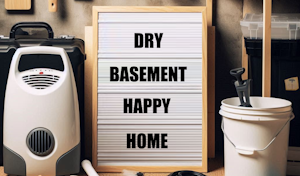Rain gutters are essential components of your home's exterior that play a critical role in...
5 Tips to Reduce Basement Moisture & Prevent Water Damage
Excessive and persistent moisture in your basement is not just a nuisance—it can lead to serious structural issues, mold growth, and health hazards. Fortunately, there are simple steps homeowners can take to reduce moisture levels and keep their basements dry.
1. Improve Drainage Around the Foundation
One of the most effective ways to reduce moisture in your basement is by ensuring proper drainage around your home. Start by cleaning out gutters and downspouts regularly to prevent water buildup. Make sure downspouts extend at least 4-6 feet away from the foundation. Additionally, grade the soil around your home to slope away from the foundation, allowing water to flow away instead of seeping into your basement.
2. Seal Cracks and Gaps
Small cracks and gaps in your basement walls or floors can let in moisture. Inspect your basement regularly and seal any visible cracks using a high-quality waterproof sealant. This simple step can significantly reduce water intrusion and prevent further damage.
3. Install a Dehumidifier
A dehumidifier is a powerful tool for controlling basement humidity. Place a dehumidifier in your basement to remove excess moisture from the air. Keep it running during humid months to maintain optimal humidity levels and reduce the risk of mold growth.
4. Ventilate the Basement
Proper ventilation is crucial for reducing moisture. Ensure that your basement has adequate ventilation by opening windows, installing exhaust fans, or using a ventilation system. This will help circulate air and reduce humidity levels, keeping your basement dry.
5. Waterproof Your Basement
For a long-term solution, consider waterproofing your basement. This may involve installing a sump pump, applying a waterproof coating to the walls, or hiring a professional contractor to assess and address any underlying issues. Waterproofing your basement is a smart investment that can prevent costly water damage in the future.
When to Call a Professional
While these DIY methods can be effective, some moisture problems require the expertise of a professional. If you've tried basic solutions and still notice persistent dampness, water seepage, or mold growth, it’s time to consult a basement waterproofing specialist.
Professionals have access to advanced solutions that homeowners typically can't implement on their own. For example, they might install a full drainage system, such as French drains, to redirect water away from your foundation. They can also perform extensive crack repairs using injection methods that penetrate deep into the foundation. Additionally, professionals may apply specialized waterproofing membranes or conduct an excavation to address external sources of water intrusion.
Hiring a professional ensures that any underlying issues are properly addressed, providing peace of mind and long-term protection for your home.




Have an idea for an article, let us know below!